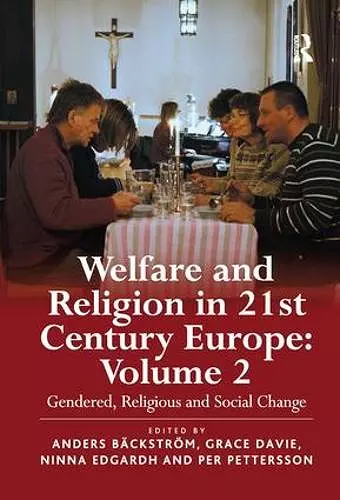Welfare and Religion in 21st Century Europe
Volume 2: Gendered, Religious and Social Change
Grace Davie editor Per Pettersson editor Anders Bäckström editor Ninna Edgardh editor
Format:Paperback
Publisher:Taylor & Francis Ltd
Published:11th May '11
Currently unavailable, and unfortunately no date known when it will be back

Historically, European churches have played a large part in the provision of welfare. Responsibility, however, has gradually shifted to the state - a shift that forms an integral part of the process of secularization and one that has been readily accepted by European populations. But what happens when the state itself begins to recede - a process that is occurring in most, if not all, European societies for a wide variety of reasons? The implications for welfare are considerable, not least for the role of the churches which begin to resume the responsibilities previously shed but in new and different ways. This book looks at the connections between religion and welfare in Europe, exploring in detail eight European societies - Finland, Norway, Sweden, England, Germany, France, Italy and Greece. The different theological traditions, different church-state relationships and different welfare regimes are all examined. The analysis is based on first hand empirical research which considers not only the changing situation on the ground, but attitudes towards this within a range of different constituencies - the churches, local government and the general public. Particular attention is paid to the significance of gender in both the process of change and in attitudes towards this. Welfare and Religion in 21st Century Europe: Volume 1 represents comparative research at its best and highlights key policy implications for the future. A companion book, Welfare and Religion in 21st Century Europe: Volume 2 explores thematically the changing nature of religion and welfare and the new relationships that are emerging between the religious and the secular, and between church and state in the 21st century.
’... the contributors ably show how questions of religious identity and belonging are central in understanding the welfare-religion relationship. ... The researchers forecast a greater role for religious groups in welfare provision, not only because of financial strains in most systems and aging populations, but also because of the more personal approach and cultivation of 'local knowledge' that characterize these groups. Yet, at the same time, the secularization well advanced in most of these countries means that churches are struggling to sustain their core functions, and that welfare recipients may not be very receptive to a faith-based approach.’ Religion Watch 'In a carefully designed collaborative volume, the editors and contributors uncover a relationship between religion and welfare in Europe that is diverse, complex, and pervasively relevant.' Journal of Contemporary Religion '... a particularly valuable contribution...' Journal of Social Policy ’This well-organized project is both informative and challenging and shows that the churches still have the potential to enhance rather than diminish the lives of Europeans, even though there may well be, as there always has been, a tension between the pastoral and the prophetic.’ Theology
ISBN: 9780754661085
Dimensions: unknown
Weight: 408g
212 pages